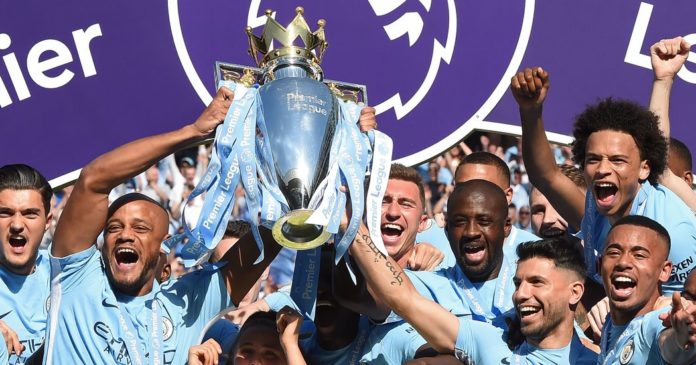MANCHESTER, England — The problem with Manchester City, as Arsène Wenger saw it, was not simply that it possessed an apparently bottomless well of wealth. It was that City was smart, too. “Petrol and ideas,” as Wenger, the former Arsenal manager, put it. “Money and quality.”
Wenger, of course, spent much of his career railing against soccer’s inexorable drift into the grasp of oligarchs and plutocrats, vainly espousing the virtues of sustainability as the game swooned before leveraged billionaires and sovereign investment funds. It was Wenger who first introduced the idea of “financial doping” to the sport, preaching parsimony during a gold rush.
By the end, though, even he did not believe City’s success could be explained solely by its balance sheet. Its pre-eminence could not have been achieved without the billion-plus pounds provided by its backer, Sheikh Mansour bin Zayed al Nahyan, but it would not have been so complete had that money not been spent so wisely.
The most obvious manifestation of that has been on the field: Pep Guardiola’s team won the Premier League last season with more points and more goals than any team in the modern era. It did so with such style, such ruthless élan that England as a whole will “forever be grateful” for Guardiola’s presence, as the former striker Gary Lineker put it. When England’s national team reached the semifinals of the World Cup last summer, many credited Guardiola, at least in part, for helping to smooth the introduction of a more modern approach.
Off the field, though, the modern City has also become a point of reference to many. City Football Group, the umbrella organization that owns City and its interlinked network of sister clubs, has been consulted by the Chinese Super League on how to run its teams more sustainably. In the United States, in particular, Major League Soccer has made use of the vast database of information held by City’s recruitment department when assessing potential signings from minor European leagues.
Even Real Madrid, a club more accustomed to leading than following, was impressed by City’s model. Executives from the Santiago Bernabéu told City’s chief executive, Ferran Soriano, that it was not something they could copy — Real’s prestige would be diluted by franchising, they felt — but they admired the concept. Like everyone else in soccer, they accepted that City was about more than just oil: it had ideas, too.
Increasingly, it seems as though that combination is simply too much for the rest of the Premier League. Guardiola’s team has dropped only four points this season; it remains on course to equal, or beat, its points total from last year. It will go into Sunday’s derby against Manchester United as a firm favorite; United, for so long the shadow City could not escape, now seems the underdog. On Tuesday, Guardiola was asked if the league as a whole would eventually suffer for City’s unimpeachable excellence. “I don’t know,” he said, “if it’s a problem.”
Similar success in the Champions League, the competition its executives — if not its fans — cherish more than any other, has proved more elusive. City does not need the trophy, though, to know that it has already joined Europe’s front rank of teams. In the documents released by the opaque whistle-blowing platform Football Leaks to the German magazine Der Spiegel, five Premier League clubs were named as party to a plan to launch a breakaway European Super League — replacing the Champions League — starting in 2021. City was among them. The petrol, and the ideas, have brought City to the head table.
Those documents, though, have painted an entirely different picture of City from the one that had convinced so many of its opponents to follow its example.
In a weeklong exposé of the methods the club has used to circumvent UEFA’s Financial Fair Play regulations — to, in a comment attributed to Simon Pearce, one of the club’s most influential executives, “do what we want” — Der Spiegel and Football Leaks have depicted a club that has, for almost a decade, worked tirelessly to deceive and co-opt the game’s authorities, to make sure the rules do not apply to City; and whenever it has not gotten its way, it has reacted with petulant anger.
There are details of inflated sponsorship deals designed to mask covert cash injections from the club’s owners; of closed payment loops with spurious third-party companies for players’ image rights; of a former manager’s salary that seems, at least in part, to have been bolstered by an “advisory” role with another club owned by Sheikh Mansour; of a secret partnership with a Danish team that may have breached rules on a club’s influence; of legal threats toward not only UEFA but to the accounting firm sent in to examine the club’s accounts; and of back-room deals with Gianni Infantino, at the time the general secretary of UEFA and now the most powerful man at FIFA.
Nobody comes out of the revelations well: not Infantino, craven and crawling; not UEFA, willing to prosecute the minnows while the sharks swim free; not the clubs, led by Bayern Munich, who talked of leaving not only UEFA but FIFA itself in search of more money; not Javier Tebas, the president of La Liga, who has called for those guilty of “dirty tricks” to be punished, which would coincidentally help several of the teams in his competition; not the clubs or organizations who should be righteously angry at flagrant rule breaches but who have maintained the silence of the complicit; and certainly not City — or, for that matter, Paris Saint-Germain — who signed up to a set of rules and promptly searched for ways to break them.
The New York Times has not seen the source documents Der Spiegel has obtained, and cannot verify them. But City has not declared any of the information reported so far to be false. It has simply dismissed the documents as a “clear and organized attempt” to smear the club’s reputation.
It might also point out, of course, that it has already been punished for failing to comply with Financial Fair Play — 60 million euros (about $68 million) in 2014, though some of it was suspended or subsequently refunded — even if, as the documents show, intensive lobbying meant that fine was substantially lighter than it might have been.
The documents suggest City is likely to believe that relief was justified, too. The club has hardly made a secret of the fact it felt Financial Fair Play was a ruse concocted by the game’s traditional elite to keep upstarts like City and P.S.G. in their place. If City was trying to find a way around the rules, it was only because the rules were unfair.
Besides, even if the allegations are true, and tens or hundreds of millions of dollars more were injected into City than the club’s accounts recorded, that does not change the fundamental truth, the one even Wenger recognized: That money alone is not enough.
That, certainly, is Guardiola’s view. “When I was at Barcelona and in Germany, always I heard that Manchester City just has money,” he said this week. “You have to accept it when people say you win just because of money. We believe that we work a lot: not just the manager, the staff and the players. If people say it is about money, we accept it, but that point of view is completely wrong. We work a lot, in a good way, and that is why I always defend us.”
City, in other words, has petrol and ideas.
There is, though, a broader issue here, one that stretches beyond whether City has been punished enough, or whether F.F.P. was well-conceived in the first place. To zoom in on those issues is to get lost in the weeds.
Even as City — like P.S.G. — reportedly poured considerable time, effort and expense into breaking UEFA’s regulations, it was simultaneously meeting any threat of a punishment with ire and anger, contemplating whether any potential fine might be better spent on a legal team to take on, and crush, the organization levying it. When the sum it would be forced to pay was eventually decided, City could afford to declare that tens of millions of euros did not “materially affect” its business.
That is the true image cast by the revelations of the last week, one that has ramifications far beyond tribal self-interest: of not just one club, but of a whole host of them that believe the rules should be altered to fit their needs; of teams so inflated by success that they can now casually disregard the diktats of their governing bodies; of teams too big to fail, beyond control.
That is what led City both to deceive and then disdain UEFA. It is what led to the endless changes to the Champions League and the tweaks to domestic cup competitions and a series of bans for illegally approaching, or signing, young players: an essential arrogance, a disregard for consequence, a belief that might makes right. It is what threatens the fundamental rupture in the fabric of the game best reflected in that Bayern-concocted plot for a breakaway super league that would involve pulling players out of all international soccer, including the World Cup.
Perhaps it is understandable that City tried to circumvent a set of rules designed, to a large extent, specifically to protect the teams it was trying to usurp. Perhaps it was justified in fighting, tooth and nail, the idea that it might be punished by what it considers a rigged system. Perhaps UEFA got lucky that it did not go to court. Perhaps, too, it would be evidence of a skewed morality to condemn City’s owners for all of that but not for the allegations of human rights abuses and oppression they have overseen in the United Arab Emirates.
But to turn a blind eye to that, as the game’s authorities seem likely to do, is to help yet again usher in a game with one rule for the rich and another for the poor; a game of governing bodies that cower at the trembling fist of the great and the good; a game of teams who decide which rules suit them, and when, and of authorities who act at the behest of their most powerful subjects and fans that contort themselves to praise actions that might otherwise draw scorn. It is to embrace a game that is not being run in the interests of the many, but the few, and a world where the quality of an idea is no match for a quantity of petrol.
Source : NYtimes













